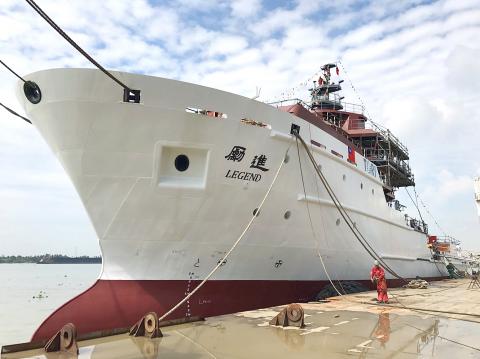The nation’s newest research vessel, Legend (勵進), is to conduct research in the South China Sea and the western Pacific Ocean next year, the Ministry of Science and Technology said yesterday.
The National Applied Research Laboratories (NARL) said that Legend was launched into waters off Ho Chi Minh City, Vietnam, on May 7 at a ceremony hosted by Representative to Vietnam Richard Shih (石瑞琦).
Legend is Taiwan’s fifth-largest research vessel and was built at a cost of NT$870 million (US$28.9 million at the current exchange rate), said officials from NARL’s Taiwan Ocean Research Institute.

Photo: Courtesy of the National Applied Research Laboratories
Built by Triyards Marine Service, a Singaporean company based in Vietnam, the vessel features a Remote Operated Underwater Vehicle (ROV) — capable of operating at depths of 3,000m — and a Gravity Core sampler that can work in waters 20m deep, Ocean Exploration Division chief Liu Shao-yong (劉紹勇) said.
Equipped with a 360° electric propulsion system, the ship’s design has eliminated traditional engines and promises onboard researchers more comfortable trips, he said.
“It will be quieter than Taiwan High Speed Rail trains when moving,” Institute Director-General Lin Hui-ling (林慧玲) said.
Legend is scheduled to conduct earthquake research in the Eastern China Sea together with Japanese research vessels before formally embarking on its own in September next year, Liu said.
There are also plans for ocean-bottom exploration in the South China Sea and in the Manila Trench, he said.
Legend is to sail to Taiwan at the end of this year after the construction of its internal equipment is completed, he added.
NARL Director Wang Yeong-her (王永和) rebutted reports that the ship might stop at Itu Aba Island (Taiping Island, 太平島) or other ports on its way to Taiwan.
It is to collect abundant research samples en route, Wang said.
Legend is to continue the work of Ocean Researcher V, which hit a reef off the coast of Penghu and sank in 2014, Liu said.

Taiwan is stepping up plans to create self-sufficient supply chains for combat drones and increase foreign orders from the US to counter China’s numerical superiority, a defense official said on Saturday. Commenting on condition of anonymity, the official said the nation’s armed forces are in agreement with US Admiral Samuel Paparo’s assessment that Taiwan’s military must be prepared to turn the nation’s waters into a “hellscape” for the Chinese People’s Liberation Army (PLA). Paparo, the commander of the US Indo-Pacific Command, reiterated the concept during a Congressional hearing in Washington on Wednesday. He first coined the term in a security conference last

Prosecutors today declined to say who was questioned regarding alleged forgery on petitions to recall Democratic Progressive Party (DPP) legislators, after Chinese-language media earlier reported that members of the Chinese Nationalist Party (KMT) Youth League were brought in for questioning. The Ministry of Justice Investigation Bureau confirmed that two people had been questioned, but did not disclose any further information about the ongoing investigation. KMT Youth League members Lee Hsiao-liang (李孝亮) and Liu Szu-yin (劉思吟) — who are leading the effort to recall DPP caucus chief executive Rosalia Wu (吳思瑤) and Legislator Wu Pei-yi (吳沛憶) — both posted on Facebook saying: “I

Sung Chien-liang (宋建樑), who led efforts to recall Democratic Progressive Party (DPP) Legislator Lee Kun-cheng (李坤城), was released on bail of NT$80,000 today amid outcry over his decision to wear a Nazi armband to questioning the night before. Sung arrived at the New Taipei District Prosecutors’ Office for questioning in a recall petition forgery case last night wearing a red armband bearing a swastika, carrying a copy of Adolf Hitler’s Mein Kampf and giving a Nazi salute. Sung left the building at 1:15am without the armband and covering the book with his coat. Lee said today that this is a serious

The Ministry of Economic Affairs has fined Taobao NT$1.2 million (US$36,912) for advertisements that exceed its approved business scope, requiring the Chinese e-commerce platform to make corrections in the first half of this year or its license may be revoked. Lawmakers have called for stricter enforcement of Chinese e-commerce platforms and measures to prevent China from laundering its goods through Taiwan in response to US President Donald Trump’s heavy tariffs on China. The Legislative Yuan’s Finance Committee met today to discuss policies to prevent China from dumping goods in Taiwan, inviting government agencies to report. Democratic Progressive Party Legislator Kuo Kuo-wen (郭國文) said